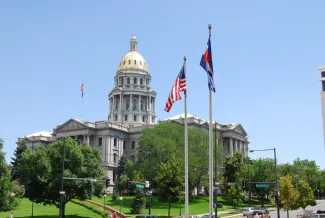
Lawmakers make no revisions to Colorado artificial intelligence law
The Colorado General Assembly wrapped up its legislative session last week without any revisions to its artificial intelligence law, which takes effect early next year.
Colorado lawmakers passed landmark AI regulation legislation in 2024. Supporters said the law will protect consumers, but critics argue it will be bad for business and innovation.
Senate Bill 24-205 put in place requirements for AI developers protecting consumers against “algorithmic discrimination” and added risk management, impact assessments and reviews for AI developers.

Governor Jared Polis last year signed the bill, which takes effect February 1, 2026, but expressed concern “about the impact this law may have on an industry that is fueling critical technological advancements across our state for consumers and enterprises alike.”
A last-minute effort to amend the law during the legislative session that ended last week was found in Senate Bill 25-318, but the bill died on the calendar despite pressure from the governor and other officials to delay SB 24-205’s implementation. The General Assembly adjourned Wednesday.
“The stakeholder collaboration that took place over many months leading up to and during the 2025 legislative session brought many ideas, concerns, and priorities to the table from a wide range of communities,” said a letter sent to lawmakers one week ago. “However, with just hours remaining in the 2025 legislative session, it is clear that more time is needed to continue important stakeholder work to ensure that Colorado’s artificial intelligence regulatory law is effective and implementable.”
The letter was signed by Polis, Denver Mayor Mike Johnston, Attorney General Phil Weiser, U.S. Senator Michael Bennet, and U.S. Representatives Joe Neguse and Brittany Pettersen.
“Together, we implore leadership and members of the Colorado General Assembly to take action now to delay implementation of SB 24-205 until January 2027,” the letter added. “Colorado communities in every corner of our state deserve the benefit of well-crafted artificial intelligence consumer protection law that more time for stakeholder engagement and policy development work will bring.”

© Khanchit Khirisutchalual - iStock-1515913422
Democratic Senate Majority Leader Robert Rodriguez, the sponsor of SB 24-205 and SB 25-318, told reporters after the session he will work with AI stakeholders in the coming weeks, KUNC reported.
"We will get working, and whether we go into special session or go into next year, we'll be in a much better place with the policy and have more consensus,” Rodriguez said, according to KUNC.
Shelby Wieman, Polis' press secretary, said late Monday afternoon, “The Governor has been clear – both in the letter he signed with Majority Leader Rodriguez and Attorney General Phil Weiser, and throughout this session – that key changes needed to be made to the law created by SB24-205.
"There is broad support for ensuring that Colorado continues to lead in technology innovation while still pioneering critical consumer protections," Wieman said in an emailed statement. "Unfortunately, the legislature failed to take meaningful action this session to address the shared principles articulated before the session, nor did they delay implementation to allow more time to plan and work on this, despite strong support from small businesses, school districts, institutions of higher education, hospitals, and other key stakeholders.
"That’s why before the bill died, the Governor joined with AG Weiser, Mayor Johnston, and members of the Congressional Delegation to call for the legislature to take action in the final hours of session," Wieman said. "This will need to be addressed, and a special session is one such venue where it could be addressed.”
In Colorado, special sessions are convened by the governor.

















